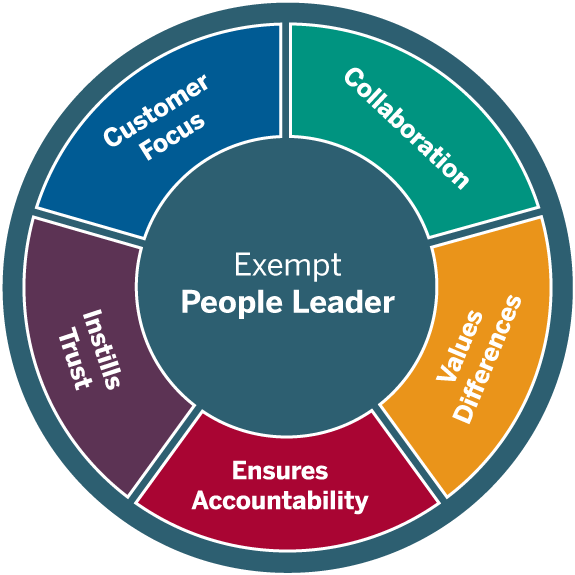Exempt People Leader: Senior Operational
DRIVES ENGAGEMENT
Creating a climate where people are motivated to do their best to help the organization achieve its objectives
Multiple studies have shown that increases in employee engagement result in improvements in profitability, quality, productivity, revenue, customer satisfaction, innovation, and retention. Engaged employees care about the right things—the things that best serve their organization. They take personal responsibility for the success of their organization and go the extra mile. But people are different and what triggers their engagement differs considerably. Engaging everyone takes a varied approach, so adapt to individuals. Find out what makes them tick so you can engage them and keep them engaged.
You show this competency when you:
- Structure the work so it aligns with people’s goals and motivators
- Empower others
- Make each person feel their contributions are important
- Invite input and share ownership and visibility
- Show a clear connection between people’s motivators and the organizational goals
How to develop this competency:
Nurture commitment to purpose and direction
When people understand the organization beyond their own role, they can better appreciate the significance of what they do. Without the broader perspective, a job is just a job. It’s the difference between “laying bricks and building a cathedral.” Clearly communicate strategy and help them see where their role fits in. Illustrate how their achievements impact other roles.
Remove barriers to success
Constantly being stalled by things is frustrating and demotivating. When roadblocks present themselves they slow things down. People feel paralyzed by something that is often out of their control. Clear the way ahead. Be relentless in identifying protected turf, sacred cows, bureaucratic processes, and resource constraints. Tear down walls built on “it’s always been that way” foundations. Be open. Challenge thinking. Ask questions.
Build a feedback-rich environment
In organizations that have created a culture steeped in candor and straight talk, giving and receiving feedback is as natural as breathing. Feedback—delivered correctly—shows people that what they’re doing is important and you care enough to help them get it right. Encourage them to reciprocate by giving you feedback. Welcome it. Learn from it. Apply it appropriately. Be a feedback role model.
Learn more:
- Book: It’s the Manager: Gallup finds the quality of managers and team leaders is the single biggest factor in your organization's long-term success by Jim Clifton and Jim Harter
- Resource: Gallup Engaging Manager Checklist
- Resource: Gallup Manager Resource Guide
- Resource: My Voice at IU
- Guide: Google Re:Work Empower your team
- LinkedIn Learning: Drives Engagement course collection
- LinkedIn Learning: Employee Engagement: My Voice at IU learning path

Exempt People Leader
- Direct Works
- Communicates Effectively
- Drives Engagement
- Manages Conflict
- Develops Talent
- Strategic Mindset
Operational
Sr. Operational
Strategic
